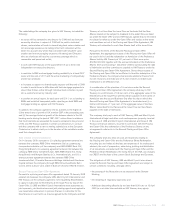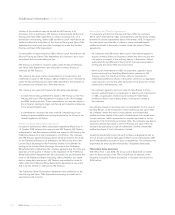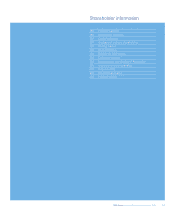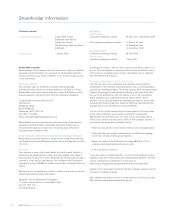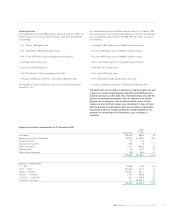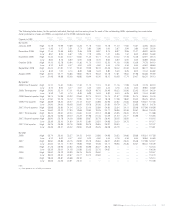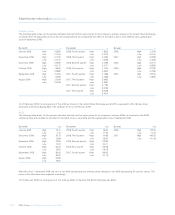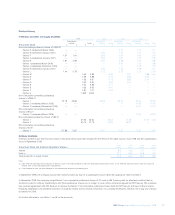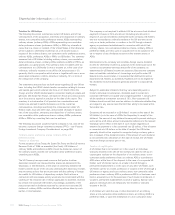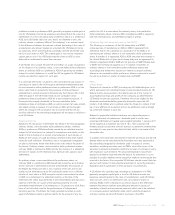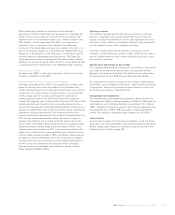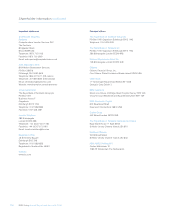RBS 2008 Annual Report Download - page 294
Download and view the complete annual report
Please find page 294 of the 2008 RBS annual report below. You can navigate through the pages in the report by either clicking on the pages listed below, or by using the keyword search tool below to find specific information within the annual report.
293RBS Group Annual Report and Accounts 2008
preference share or preference ADS, generally recognise capital gain or
loss for US federal income tax purposes (assuming that in the case of a
redemption of a non-cumulative dollar preference share or a preference
ADS, such US Holder does not own, and is not deemed to own, any
ordinary shares or ordinary ADSs of the company) in an amount equal
to the difference between the amount realised (excluding in the case of
a redemption any amount treated as a dividend for US federal income
tax purposes, which will be taxed accordingly) and the US Holder’s tax
basis in such share or ADS. This capital gain or loss will be long-term
capital gain or loss if the US Holder held the share or ADS so sold,
disposed or redeemed for more than one year.
A US Holder who is liable for both UK and US tax on a gain recognised
on the disposal of an ordinary share, a non-cumulative dollar preference
share, an ordinary ADS or a preference ADS will generally be entitled,
subject to certain limitations, to credit the UK tax against its US federal
income tax liability in respect of such gain.
If a corporate US Holder is subject to UK corporation tax by reason of
carrying on a trade in the UK through a permanent establishment and
its non-cumulative dollar preference share or preference ADS is, or has
been, used, held or acquired for the purposes of that permanent
establishment, certain provisions introduced by the Finance (No. 2) Act
2005 will apply if the US Holder holds its non-cumulative dollar
preference share or preference ADS for a ‘tax avoidance purpose’. If
these provisions apply, dividends on the non-cumulative dollar
preference share or preference ADS, as well as certain fair value credits
and debits arising in respect of such share or ADS, will be brought
within the charge to UK corporation tax on income and the UK tax
position outlined in the preceding paragraphs will not apply in relation to
such US Holder.
Estate and gift tax
Subject to the discussion of the Estate Tax Treaty in the next paragraph,
ordinary shares, non-cumulative dollar preference shares, ordinary
ADSs or preference ADSs beneficially owned by an individual may be
subject to UK inheritance tax (subject to exemptions and reliefs) on the
death of the individual or in certain circumstances, if such shares or
ADSs are the subject of a gift (including a transfer at less than market
value) by such individual. (Inheritance tax is not generally chargeable
on gifts to individuals made more than seven years before the death of
the donor). Ordinary shares, non-cumulative dollar preference shares,
ordinary ADSs or preference ADSs held by the trustees of a settlement
will also be subject to UK inheritance tax. Special rules apply to such
settlements.
An ordinary share, a non-cumulative dollar preference share, an
ordinary ADS or a preference ADS beneficially owned by an individual,
whose domicile is determined to be the United States for purposes of
the Estate Tax Treaty and who is not a national of the UK, will not be
subject to UK inheritance tax on the individual’s death or on a lifetime
transfer of such share or ADS, except in certain cases where the share
or ADS (i) is comprised in a settlement (unless, at the time of the
settlement, the settlor was domiciled in the United States and was not a
national of the UK); (ii) is part of the business property of a UK
permanent establishment of an enterprise; or (iii) pertains to a UK fixed
base of an individual used for the performance of independent
personal services. The Estate Tax Treaty generally provides a credit
against US federal estate or gift tax liability for the amount of any tax
paid in the UK in a case where the ordinary share, non-cumulative
dollar preference share, ordinary ADS or preference ADS is subject to
both UK inheritance tax and US federal estate or gift tax.
UK stamp duty and stamp duty reserve tax (SDRT)
The following is a summary of the UK stamp duty and SDRT
consequences of transferring an ADS or ADR in registered form
(otherwise than to the custodian on cancellation of the ADS) or of
transferring an ordinary share or a non-cumulative dollar preference
share. A transfer of a registered ADS or ADR executed and retained in
the United States will not give rise to stamp duty and an agreement to
transfer a registered ADS or ADR will not give rise to SDRT. Stamp duty
or SDRT will normally be payable on or in respect of transfers of
ordinary shares or non-cumulative dollar preference shares and
accordingly any holder who acquires or intends to acquire ordinary
shares or non-cumulative dollar preference shares is advised to consult
its own tax advisers in relation to stamp duty and SDRT.
PROs
United States
Payments of interest on a PRO (including any UK withholding tax, as to
which see below) will constitute foreign source dividend income for US
federal income tax purposes to the extent paid out of the current or
accumulated earnings and profits of the company, as determined for
US federal income tax purposes. Payments will not be eligible for the
dividends-received deduction generally allowed to corporate US
holders. A US Holder who is entitled under the Treaty to a refund of UK
tax, if any, withheld on a payment will not be entitled to claim a foreign
tax credit with respect to such tax.
Subject to applicable limitations that may vary depending upon a
holder’s individual circumstances, dividends paid to certain non-
corporate US Holders in taxable years beginning before 1 January 2011
will be taxable at a maximum tax rate of 15%. Non-corporate US
Holders should consult their own tax advisers to determine whether they
are subject to any special rules that limit their ability to be taxed at this
favourable rate.
In addition, bills have been introduced in both the US House and the US
Senate which would have denied the favourable tax rates described in
the preceding paragraph for dividends paid in respect of certain
securities, including securities such as PROs, where the issuer of the
securities is allowed a deduction under the tax laws of a foreign country
with respect to such dividend. The proposed legislation would have
applied to dividends received after the date of its enactment. It is not
possible to predict whether similar legislation might be reintroduced and
enacted in the future. Non-corporate US Holders should consult their tax
advisers with respect to the potential enactment of currently proposed
legislation and its application in their particular circumstances.
A US Holder will, upon the sale, exchange or redemption of a PRO,
generally recognise capital gain or loss for US federal income tax
purposes (assuming that in the case of a redemption, such US Holder
does not own, and is not deemed to own, any ordinary shares or
ordinary ADSs of the company) in an amount equal to the difference
between the amount realised (excluding any amount in respect of
mandatory interest and any missed payments which are to be satisfied
on a missed payment satisfaction date, which would be treated as
ordinary income) and the US Holder’s tax basis in the PRO.


